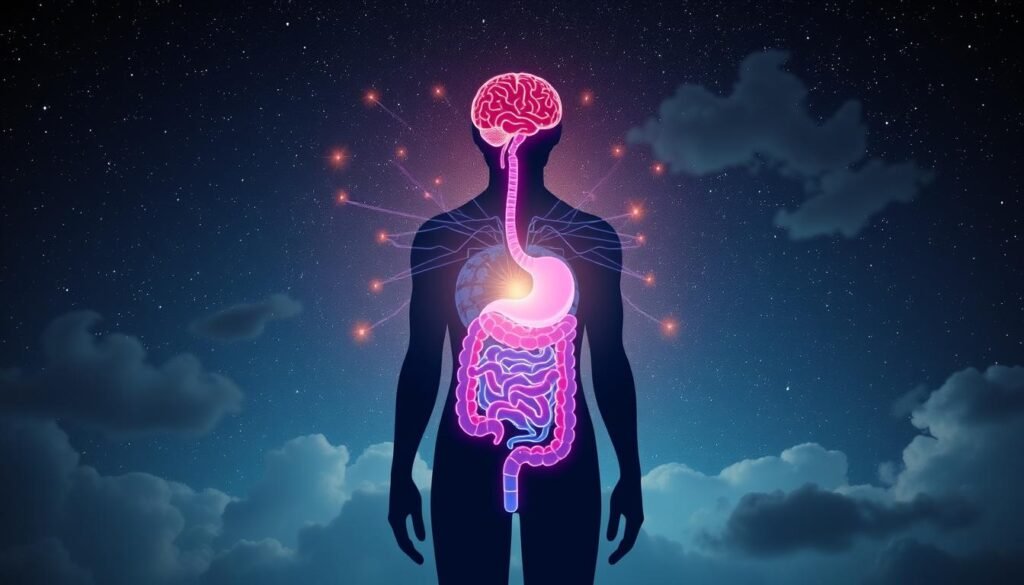Did you know over 30% of folks with insomnia have major sleep problems? Probiotics are famous for helping our guts, but there’s a new discussion. It’s about if they can also cause sleep troubles. This article will look into how gut health affects sleep. We’ll see if these helpful bacteria might make some people toss and turn at night.
We need to know how probiotics impact sleep. Studies show they can improve mood and how we think. But, they don’t work the same for everyone. This difference has sparked questions about their safety. We’ll dive into how gut health and sleep are connected. This could help us find better ways to beat insomnia.
Key Takeaways
- Over 30% of people with insomnia experience sleep disruptions.
- Probiotics have various effects on gut health that may influence sleep.
- The relationship between probiotics and sleep is still being researched.
- Individual responses to probiotics can vary widely.
- Probiotic safety is a consideration for those suffering from insomnia.
- Understanding gut health can provide insights into effective insomnia remedies.
Understanding Probiotics and Sleep
Probiotics are key for good gut health and might affect how well we sleep. These beneficial microorganisms, like Lactobacillus and Bifidobacterium, improve digestion. Learning about their impact provides insights into their role in sleep.
What are Probiotics?
Probiotics are good bacteria found in some foods and supplements. They help keep our gut healthy, which is vital for our well-being. They can improve our mood and sleep quality by enhancing gut health. Studies have shown that they may help people sleep better and longer.
How Probiotics Interact with the Body
Probiotics affect us through the gut-brain axis, which is vital. They produce neurotransmitters that can change our mood. Research has found that a healthy gut can improve sleep patterns by affecting the brain’s chemistry. A diverse gut microbiome can make us more alert and clear-minded, especially after bad sleep.
It’s important to study different probiotic strains and their effects on sleep and gut health. Research shows a healthy gut can lead to better sleep. For more on probiotics and sleep, read this study.
The Science of Sleep
Sleep is complex and has different stages like non-REM and REM sleep. Each stage is key for our health, affecting both our body and mind. In non-REM sleep, our bodies rest deeply and repair themselves. REM sleep, however, is when we dream and process emotions.
What Happens During Sleep?
Sleep cycles repeat through the night, usually lasting about 90 minutes each. These cycles are made up of:
- Non-REM Stage 1: This is light sleep, and waking up is easy.
- Non-REM Stage 2: True sleep begins, heart rate slows, and body cools down.
- Non-REM Stage 3: This deep sleep stage is crucial for physical recovery.
- REM Sleep: Brain activity picks up, dreams happen, and memories form.
Every cycle is key for our health and well-being. The gut microbiota impacts our sleep patterns and can lead to sleep issues.
The Importance of Sleep for Health
Good sleep is essential for our health. Not sleeping enough can make us eat more, about 300 extra calories a day. It can mess with our metabolism and increase stress hormones. These changes disturb our sleep cycle.
Lack of sleep can also upset our gut bacteria. This can make us feel anxious or depressed. Eating a diet full of fiber and fermented foods can help keep our gut and sleep healthy.

Learning about sleep shows its effect on our health and the importance of a healthy gut. A healthy gut leads to better sleep patterns and overall well-being.
| Stage of Sleep | Characteristics | Impact on Health |
|---|---|---|
| Non-REM Stage 1 | Light sleep, easily awaken | Initial relaxation, beginning of restorative process |
| Non-REM Stage 2 | Decreased heart rate, body temp drops | Preparation for deep sleep; memory consolidation |
| Non-REM Stage 3 | Deep sleep, difficult to awaken | Physical recovery, immune function support |
| REM Sleep | Vivid dreams, increased brain activity | Cognitive restoration, emotional health enhancement |
Gut Health and Its Impact on Sleep
The link between your gut health and sleep is crucial. A balanced digestive system is key for good well-being. The gut-brain connection shows how gut microbes affect not just digestion but also your mood and sleep.
The Gut-Brain Connection
The gut and brain talk to each other via a crucial pathway. This connection relies on things like neurotransmitters. For example, serotonin helps control mood and sleep. If gut bacteria are out of balance, it might mess up serotonin production. This can lead to sleep problems or even insomnia.
Eating probiotics can boost your gut health and mental state. This, in turn, can lead to better sleep.
How Gut Microbiota Affects Mood
Certain gut bacteria play a big role in controlling mood, which affects sleep. More of Lachnospiraceae UCG004 and Odoribacter bacteria mean longer sleep. On the flip side, Selenomonadales and Negativicutes bacteria can make insomnia more likely. What you eat is vital for your gut microbes. A diet high in fiber can help you sleep deeply and grow good bacteria. But too much caffeine or alcohol can hurt your sleep and gut balance.
In short, keeping your gut healthy is great for your sleep. Drink plenty of water, eat foods with probiotics, and cut back on processed stuff. This can help your gut and brain work better together, improving your sleep.

| Bacteria Type | Impact on Sleep |
|---|---|
| Enterobacteriaceae | Linked to evening chronotype. |
| Anaerofilum | Associated with night owls. |
| Selenomonadales | Linked with higher rates of insomnia. |
| Negativicutes | Linked with insomnia. |
| Lachnospiraceae UCG004 | Associated with longer sleep duration. |
| Odoribacter | Associated with longer sleep duration. |
Research Linking Probiotics to Insomnia
New studies suggest a big link between probiotics and insomnia. They mainly look at how probiotics affect mood and sleep. Many studies show probiotics might help with emotional well-being and sleep patterns. This connection suggests probiotics could help manage insomnia.
Studies on Probiotics and Mood Improvement
Recent research finds probiotics may positively affect our emotions. This is due to the gut-brain connection, which lets our microbiota influence brain function. People taking certain probiotics felt less anxious and more upbeat. This could lead to better sleep.
Researchers exploring these effects found a varied gut microbiome links to better mental health. Since gut bacteria influence neurotransmitters, the mood-lifting effects of probiotics are clearer.
Effects of Probiotics on Sleep Quality
Research shows probiotics can really improve sleep. People who took probiotics saw better sleep efficiency and length than others. Disruptions in gut microbiota, or dysbiosis, can hurt sleep. The gut’s effect on neurotransmitters like serotonin and melatonin helps control sleep.
Some probiotics are found to enhance sleep quality significantly. This discovery is crucial for those dealing with insomnia. For more on these studies, check out this article.

Do Probiotics Cause Insomnia?
Talk about probiotics often focuses on their benefits. Yet, some worry about probiotic side effects, especially on sleep. The link between taking probiotics and having trouble sleeping is complex, involving many factors.
Understanding Potential Side Effects
Probiotics might cause sleep problems for some people. Though they’re great for digestion, they might disturb sleep for others. Those sensitive might find themselves up at night, wondering: do probiotics cause insomnia? The FDA hasn’t approved probiotics for treating sleep issues, so use them carefully.
Investigating Specific Probiotic Strains
Certain probiotic strains may impact sleep differently. For example, Lactobacillus plantarum, Lactobacillus gasseri, and Bifidobacterium longum have been shown to help with sleep. However, some strains could disrupt sleep instead. More studies are needed to find out which strains help and which may cause problems.
Common Probiotic Supplements
Probiotic supplements are becoming very popular for people with sleep problems. These supplements have live organisms that help improve gut health. This can also make your sleep better. It’s key to choose the right probiotic types if you struggle with sleepless nights.
Your Options for Probiotic Supplements
Today, you can find many types of probiotic supplements. Some top picks include:
- Culturelle – This has Lactobacillus rhamnosus, great for gut health.
- Garden of Life – Comes with a mix of Bifidobacterium and Lactobacillus strains for all-around health.
- Align – Uses Bifidobacterium longum, linked to better digestion.
These supplements aim at different health issues, like better sleep and mood.
Choosing the Right Strains for Sleep
For better sleep, some probiotic strains are quite helpful. Lactobacillus fermentum and Bifidobacterium longum are known to boost melatonin production. This hormone is key for sleep. Our gut affects sleep through the serotonin neurotransmitter, thanks to these probiotics.
To enhance sleep quality, choose supplements with these strains. More studies are finding the best mixes and amounts for sleep. Knowing how these strains affect you personally can help improve your health. Check out this article for more information on probiotics for sleep.
How to Improve Gut Health for Better Sleep
Getting better sleep starts with improving gut health. What you eat is key to a balanced microbiome, which helps your sleep. A healthful gut can ease insomnia and boost overall health.
Dietary Changes to Support Gut Health
To help your gut, changing what you eat is a big step. Eating whole, unprocessed foods is important. Adding lots of plant-based foods helps grow good bacteria. Here are some food tips:
- Fruits and Vegetables: Full of fiber and antioxidants, they’re good for your bacteria.
- Whole Grains: They have a lot of fiber for healthy digestion.
- Legumes: They’re a source of prebiotic fibers which is great for your gut.
- Nuts and Seeds: They have nutrients that make your microbiome diverse.
- Fermented Foods: Things like yogurt, kefir, and kimchi give you probiotics to improve your gut flora.
Incorporating Prebiotics and Probiotics
Adding prebiotics and probiotics to your diet is key for good gut health. Prebiotics feed good bacteria, while probiotics bring in beneficial ones. This combo improves gut health and sleep.
| Food Type | Prebiotic Sources | Probiotic Sources |
|---|---|---|
| Fruits and Vegetables | Bananas, Garlic | Kefir, Sauerkraut |
| Whole Grains | Oats, Barley | Yogurt, Miso |
| Legumes | Chickpeas, Lentils | Tempeh, Fermented Soy Products |
| Nuts and Seeds | Flaxseeds, Almonds | N/A |
Making these changes can help good bacteria grow for better sleep. This whole approach can make your health better and your nights more restful.
Insomnia Remedies Beyond Probiotics
Many people look for natural ways to fight insomnia. There are several remedies that can help improve sleep without only using probiotics. These methods aim to get to the bottom of sleep problems. They help you relax more and make your sleeping area better.
Other Natural Solutions for Sleep Disorders
There are many natural methods to deal with sleep issues. Here are some good choices:
- Herbal Supplements: Herbs like valerian root, chamomile, and passionflower can help you relax and sleep better.
- Mindfulness Practices: Meditation, deep breathing, and yoga can calm your mind and get your body ready for sleep.
- Lifestyle Adjustments: Having a regular sleep time, cutting down on caffeine, and making your sleeping area peaceful can greatly help.
- Nutrition: Eating foods high in magnesium, like almonds and spinach, may improve your sleep. A well-balanced diet is key to good sleep.
When to Seek Professional Help
If you’re still struggling with sleep after trying these tips, it’s important to see a doctor. Long-term sleep problems can hurt your health. A doctor can figure out if there’s a deeper issue and offer the right treatment. This custom help is very important if you can’t find relief.
Conclusion
The link between probiotics and not being able to sleep well is both complex and fascinating. Probiotics help improve mood and sleep but aren’t right for everyone. Research shows that 10-30% of people worldwide have trouble sleeping.
This shows how common sleep problems are. Studies also found that probiotics make sleep better. This is shown by lower scores on the Pittsburgh Sleep Quality Index (PSQI).
Keeping a healthy gut balance is key. This is because stress and worry can change gut health and sleep. Probiotics help fix these issues by bringing the gut back to a healthy state. Using certain probiotics like Lactobacillus fermentum and Bifidobacterium longum can really help with sleep.
Everyone should see how they react to supplements. Talking to a doctor about sleep problems is wise. For tips on improving wellbeing through better gut health and sleep, staying informed and making smart choices is crucial. It’s essential to focus on your health journey.